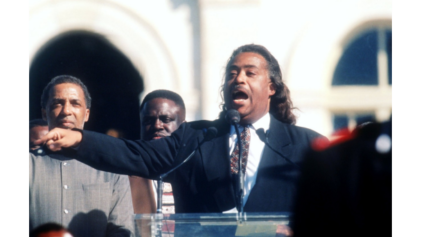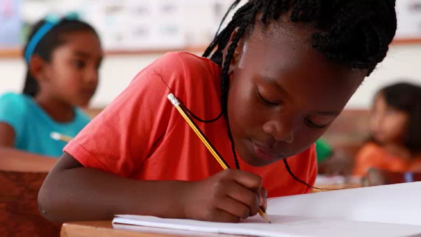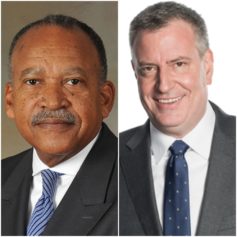After being ignored during eight years of Rudy Giuliani and outraged by a decade of Michael Bloomberg, New York City’s black community is in a rare position of power in next week’s mayoral election primary. Blacks are expected to make up 30 percent of the electorate and they are being ardently courted by the leading contenders—Bill Thompson, the former controller who is African-American, and Bill de Blasio, the city’s public advocate, who is white but whose wife is African-American.
Bill de Blasio and wife wife Chirlane McCray; photo credit: Anthony del Mundo, New York Daily NewsA recent poll by Quinnipiac College showed de Blasio ahead of Thompson among African-American voters by 34 percent to 25 percent—a 4 percent jump for de Blasio in the last two weeks.
The same poll had City Council Speaker Christine Quinn at a distant third with 15 percent of the black support.
De Blasio was the choice of 36 percent of voters overall, meaning he may be on the verge of reaching the magical threshold of 40 percent in the September Democratic primary, which would allow him to avoid a runoff. If no candidate crosses the 40 percent threshold, the top two finishers would meet in an Oct. 1 runoff to decide who will be the Democratic candidate—and likely the winner—in the November general election against Giuliani’s former deputy mayor, Republican Joe Lhota.
De Blasio has not been shy about campaigning with his African-American wife and their 15-year-old son, Dante, who has been the star of two of his TV commercials. Dante’s Afro even has its own Twitter following under hashtag fromentum— although some critics have accused the campaign of exploiting the biracial child and his hair.
De Blasio and Thompson are grappling for the key endorsement of Rev. Al Sharpton, whose nod is considered a major force to push either candidate over the edge.
Sharpton told the New York Daily News on Saturday that he’s “pretty much” narrowed down his choices to Thompson and de Blasio.
“I’ve met with Bill Thompson again and Bill de Blasio again,” he said. “I may wait to see if there’s a runoff.”
While some have claimed that de Blasio is getting black support because of his wife, observers say that would be missing the motivations of the African-American community.
“It is a mistake to say the African-American vote is monolithic,” said political consultant Basil Smikle. “The African-American community is changing – there is a diversity in income, in education, in where we live. … There’s not a knee-jerk reaction to get behind the black candidate.”
In addition, de Blasio has been one of the most fiery critics of Bloomberg’s controversial stop-and-frisk policy, which a federal judge has ruled unconstitutionally violates the rights of blacks and Latinos.
“I think a lot of African-American voters want a fighter,” said Smikle, who is unaffiliated with any campaign. “They want someone who has fire in his belly, someone who is not afraid to push the institution.”
That’s why some black voters initially were drawn to former U.S. Rep. Anthony Weiner’s feistiness. But after Weiner’s sexting troubles, many African-Americans switched to de Blasio.
“I feel like he gets it,” said Derick Johnson, 53, a retired welder who lives in the Bedford-Stuyvesant neighborhood of Brooklyn. “There’s truth inside of him.”


